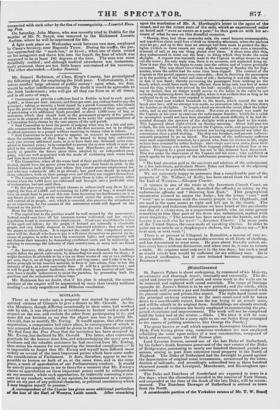• Mr. Samuel Robinson, of Clara, King's County, has promulgated
the following plan for employing the Irish poor. Unfortunately, it in- volves another large advance of public money ! upon what, we fear, would be rather indifferent security. No doubt it would be agreeable to the Irish landowners ; who will get all they can from us at all times, and in all sorts of ways.
" Government to provide a sufficient fund in Dublin to lend to each parish 1,0001., at three per cent, interest, and three per cent. as a sinking fund to pay the principal ; taking as security a bond signed by a parish Committee, who should have the power of levying such assessment on the property of their parish, and of purchasing with additional funds provided as above 1,000 acres of bog or mountain, which they should hold as the permanent property of the parish, never to be assigned or sold, but at all times to be under the superintendence of a Committee freelychosen by the rate-payers of the said parish.
" Said Committee to have the power of judging what may be a fair and suit- able remuneration for labour given ; and in the first instance, not to be obliged to afford assistance to a pauper without receiving in return value in labour. " Said Committee to have power to appoint an overseer to superintend for them the reclamation of their bogs ; to be bound to bring into cultivation each year seventy additional acres, so as to have their one thousand acres com- pleted in fourteen years; to be compelled to pursue the system which is now ap- plied to the reclamation of Chatmos Bog, near Manchester, and to follow as nearly as possible the future plans there adopted, by an independent com- pany, who are well acquainted with the mode of reclaiming such waste land, and have been very successful. " The Committee, when all the waste land of their parish shall have been cul- tivated, should have the power given them to apply their funds to settle in the British Colonies such of their poor whom they cannot procure employment for, and who may voluntarily offer to go abroad ; but good care should be taken of those volunteers, both on their passage over and till they can support themselves. " The Committee might have power given them to take, or purchase, other wastes when the 1,000 acres are cultivated and brought into a profitable state of reclamation, but not until then. "By this plan every parish which chooses to relieve itself may do so by ac- cepting the loan of 1,000/. and reclaiming its 1,000 acres of bog; it would then have an ample fund to prevent this rate from becoming too burdensome on it at .any future period ; and, at the same time would secure the peace, civilization, and content of its people, and, which is essential, also preserve the stimulant to go on improving, for the amount of the assessment would still depend on the demand on the parish."
Now for the security-
" The capital lent to the parishes would be well secured by the assessment ; Ireland would soon have all her immense wastes cultivated, and her surplus population found in remunerative employment. Good care would then be taken of the aged and infirm ; for the people of Ireland are naturally a charitable people, and very kindly disposed to their distiessed relatives; they only want the means to relieve them. It is expected the result of this compulsory assess- ment will be, that all who have to pay it will exert themselves to prevent an hi- crease of paupers, in order to have the assessment. light ; and consequently will not distress their tenantry by demanding- exorbitant rents, and by neglecting or refusing to encourage the industry of their countrymen, as many now are found to do.
"As, however, this plan would bring the bogs into demand, the landlords might defeat the parish cultivation, by demanding too much money for them ; it might therefore be advisable to lay a tax on those wastes of one or two shillings per acre, that is, on all bogs growing heath and hog-moss; and I take it to be a better principle to tax inactive material, to force it into action than to tax the industry of man' as is now constantly done. It will be a productive tax ; and it will be paid by opulent landlords; who will then, from motives of self inte- rest, have a double inducement to assist the parishes, by promoting both the purchase and the reclamation of these bogs."
Mr. Robinson has no doubt, that if his plan is adopted, the annual produce of the empire will be augmented by more than twenty millions sterling l—a truly magnificent and Alilesian conclusion.






















 Previous page
Previous page